The Google business review system is suffering from fake negative comments commissioned by competitors or published by trolls acting alone. What can you do to combat this?
Short story: my client received what was clearly a fake Google review from a fake Google account. The claims made were outrageous.
I looked at the activity history of the reviewer’s Google account to try and discover any mucky digital fingerprints, hoping to piece together a bigger picture. 👤
There were six total reviews according to the user activity history, but I couldn’t for the life of me find a way to view the other five. 🔬
Most likely, they’d been removed.
The best part (and the big indication their review was a fake) is that the reviewer used the alias “Cheesy Wotsit”. 🥸🤨
Here’s the review. I removed the name of the business to spare my client any further hassles:
So, did this person have an axe to grind? Was it a jealous competitor? Who knows? Naturally, you’ll want to report it and have it removed. 🚨
Google is Apathetic to Review Issues
One of the problems is that Google won’t remove the review unless it actually breaks their review policies, which they claim hadn’t happened in the case of my client. 😑
Same story everywhere.
A New York business owner posted in the Google Advertising Forums, complaining not only about how easy it is for just about anyone to publish damaging false statements, but how hard it is to be taken seriously by Google after the fact. 😔
Much of the review system support is outsourced to south Asia, sometimes resulting in cultural differences that prohibit common understandings crucial to the complaint. 🤦♂️
Case in point:
“We suspect that a terminated employee is writing multiple 1 star reviews on our page, using different accounts. All the google profile names from these reviews are not names of any current or former customers or employees, so they are all obviously fake. The most outrageous one is from “Jack Meoff”. I really hope a supervisor was listening in on my call to google support when I was trying to explain what “Jack me off” meant to the clueless Indian support rep. I told him to google it! Anyway, this particular review includes many policy violations including personal attacks and sexualizing children, but google doesn’t seem to care one bit. This is so frustrating. Does anyone here have experience going the legal route? We’ve flagged and flagged and flagged, many times.”
Others believe the entire review system is just flawed:
“Google shouldn’t even have a review system on the business listings. They clearly don’t have a robust enough system to protect business reputations from trolls and defamatory comments.”
The frustration is articulated here in Dear Google: 4 suggestions for fixing your massive problem with fake reviews.
Let’s examine the parts of the review policy that could apply to my client’s situation. 🧐
Google Review Policy Breached?
The user “Cheesy Wotsit” can actually be held up as an example of Google’s own review policy being broken:
“Impersonation: Don’t post reviews on behalf of others or misrepresent your identity or connection with the place you’re reviewing.”
Now, it’s possible that Mr and Mrs Wotsit named their petulant troll of a child “Cheesy” which would mean the review was written by a legitimate, identifiable individual. Or it’s a fake name and a misrepresentation of identity. 👺
Policy: “Honest Representations” in Reviews
Google also say the following on their review policy page:
“Summary: Make sure that the reviews on your business listing, or those that you leave at a business you’ve visited, are honest representations of the customer experience. Those that aren’t may be removed.”
How, then do we report a fake review? It’s going to involve contacting Google. 👇
Reporting a Google Review
If you’re an Adwords customer managing your own account, you’ll have a Google representative acting as a company liaison. You might be able to contact the rep and mention the issue to see if they’ll pass it to the appropriate department.
Otherwise, there are four levels of escalation:
- Flag the review for moderation
- Contact Google directly
- Raise the issue in the Google Product Forum
- Make a legal removal request
Let’s go into a bit more detail on each of those.
1. Flagging
The fake review must be flagged, as this enables a human editor at Google to examine the content and the account of the person who posted it. They will review the review.
Search your business name in Google maps or Google search. You want to open up the reviews panel.
Hover your mouse cursor to the right hand side of the review date and a flag icon will appear. Click it.
You’ll be taken to a page like this.
Flagging Choices
At the time of writing this article, there are four choices for flagging:
- This post contains hateful, violent or inappropriate content
- This post contains advertising or spam
- Off-topic
- This post contains conflicts of interest
To report a false identity choose “This post contains conflicts of interest”. For any other violations you would need to use your best judgement to check the correct category.
According to this Local Search Forum post:
“Google’s internal policy is that they won’t do anything unless it’s flagged by 5 different Google accounts…So, you need to get 5 different Google accounts to flag the review. That’s going to be the fastest way to deal with that review spam.”
If you know people with Google accounts you could call in a favour from each of them. Ask them to flag the review.
2. Contact Google Directly
If that fails, you can try requesting a phone call, starting an instant chat or sending an email to Google.
The contact process changes frequently but in September 2017 that is what works.
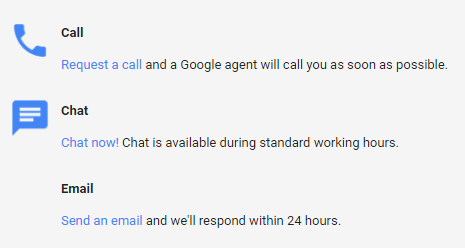
At the time of writing these three contact options are available on the site.
Phone support isn’t great. If you get a bad rep, you might know more than they do!
This link can be used to get in contact with them too.
That’s why you might want to contact GMB through their Twitter, which is a very good channel but can take a couple of weeks for them to respond.
3. Google Product Forum
The Google Product Forum covers all their products and services. This includes Google My Business and the subcategory of reviews.
One of the advantages of the forum is that it is frequented by Google top contributors and employees. Top contributors are deputised volunteers who get special privileges (events, beta access to products) in return for answering questions and helping out.
Get the attention of a top contributor and you might get the issue escalated to a Google employee.
4. Legal Removal Requests
Earlier I mentioned Google’s legal obligations and greater responsibilities in handling false content, fake news and libel, which extends to them having to act upon legal removal requests.
Remember when the “right to be forgotten” EU privacy ruling came in to force? It means Google is obliged to remove search engine results on request.
With Google’s review policy as a reference, you want to aim to demonstrate beyond reasonable doubt that a crime has been committed and – crucially – that Google is enabling it.
- You want to to cite whichever law is being broken, which, if you’re in the UK would be the:
- Communications Act 2003 (obscene, threatening, harassing, indecent, damaging, false).
- Defamation Act 2013 (incurred damages, attacks on reputation).
- If you’re in the USA you need a court order to make the removal request. The UK seems to have it a bit easier in that regard.
- This removal request form is the place to go to submit your request. Select the radio button “Google My Business”.
- You’ll be taken to to a page on removing content from Google.
Is it a Criminal Offence to Post False Information?
If someone is posting harassing information about you online, you’d need to decide whether it is a legal or civil matter. A guilty individual can still be reprimanded either way, with penalties imposed by the courts.
The website Ask the Police answers questions on subjects including criminal offences and the internet in England and Wales.
One user asked: Someone is posting false information about me on Facebook/Twitter/a social networking site. Is this a criminal offence?
You can read the full response but here’s an extract:
“For harassment to be committed, there must be a ‘course of conduct’ (i.e. two or more related occurrences). The information does not necessarily have to be violent in nature, but must be oppressive and need to have caused some alarm or distress. See Q497 for further information regarding this offence.
“If the information is indecent, grossly offensive, obscene or threatening/menacing, then an offence relating to ‘malicious communications’ may have been committed. This offence does not require more than one incident. You can report any of these offences to your local policing team and they will then investigate and take appropriate action.”
Demonstrate the Harassing and Damaging Nature of Fake Negative Reviews
A story in the British press reported a restaurant in Worcester that suffered a 25% sales slump after a woman posted dozens of false reviews. It became a legal matter because of the harassing nature of the comments she wrote.
She was caught, cautioned and forced to apologise.
More to the point, TripAdvisor (who had been largely unhelpful in the matter) was made to apologise when “the Advertising Standards Authority upheld complaints that TripAdvisor’s claims to offer ‘trusted advice from real travelers’ was misleading.”
The Black Market of Fake Reviews
Services such as Fiverr actually sell negative reviews. Hiring someone to use fake accounts to publish damaging false testimony is a booming trade often operated from overseas by shady individuals.
Fake review accounts are made to look as realistic as possible using photos, status updates, location etc, but there’s normally something that gives it away; a familiar pattern of recurring profile information or a conflicting life story that doesn’t ring true. 🗣️👥🤔
Build a body of evidence using screenshots, texts, video and audio recordings to back up your suspicions. 🧐🔍🔬📑
UK Government Cracks Down on Fake Online Reviews
Simon Wadsworth of Reputation Matters says the UK government intends to crack down on fake online reviews.
The UK government’s Department for Business Innovation and Skills (BIS) could make the posting of fake reviews illegal. At least one company has been publicly dressed down for posting over 800 fake reviews. 👊👏
The UK Competition and Markets Authority has investigated online reviews and endorsements.
In their 2015 report (PDF) they say they had “become aware of a number of concerns about the potential for reviews and endorsements to mislead consumers and distort their decisions. We were concerned that, if true, this could lead to detriment for both consumers and businesses.”
Page 4 of their report mentions the fake negative reviews problem:
“Businesses or individuals writing or commissioning fake negative reviews. This may be carried out by businesses trying to undermine their rivals or by individuals acting maliciously or for personal gain. The practice may affect consumers’ choices. We have also heard, particularly from businesses in the hospitality industry, that small businesses can be badly affected by fake negative reviews.”
Apparently, these sorts of practices may breach the Consumer Protection from Unfair Trading Regulations 2008 (CPRs):
“…we have heard about a number of practices in these sectors that potentially breach the law. We are concerned that these practices may lead to good businesses that play by the rules losing out because other businesses do not.”
Footnote 3 in the report says that their investigation does not influence the courts and shouldn’t be used as a legal basis.
Hi, this page contains everything we’ve published, + cases pursued, following from the online reviews call for info https://t.co/gYeNKBXy8P
— CMAgovUK (@CMAgovUK) September 19, 2017
Edit: There’s a 2023 UK bill aimed boosting competition, clamping down on subscription traps and fake reviews. 🚫🪤🥸
Filing a Police Report
If an impersonator makes a false statement that damages the reputation of an individual or business or exposes them to hatred, ridicule or avoidance then this could be termed defamation – at least in the UK.
Because this is NOT a police matter, it should not be reported to the police but rather to Citizens Advice. ✊
If, however, the content of a review contains hatred and ridicule aimed directly at the business owner, this is a police matter. It’s harassment. 🫣😓🚔
Summary: Tread Carefully, Gather Evidence, Don’t Feed the Trolls
Written defamation is libel, but it can be hard to prove. Nevertheless, most internet users are intelligent enough to realise competitors and trolls exist.
In fact, reviews that are 100% positive in certain industries (hospitality, for example) actually look suspicious. ✅🎖️ 🏆 🏅🥇 👍✨
If you have a good website with useful, quality, engaging content, and a decent social media footprint showing you in your best light, the negative reviews are not such a disaster. 🥲🤞
Tell your side of your business story in a way that corroborates the good reviews. But in the meantime, switch off your hurt feelings and get the fake review(s) reported through all the channels mentioned. 🧐🤜
I found this video online where a guy goes through his process of removing fake reviews. This can give you an idea of what you might have to do as well. ⚖️👇
More Small Business Groundhog Day Troll Drama
🤬 Argh! Why Does Google Delete Genuine Business Reviews?
🧐 Dealing with Negative Comments on Your Paid Social Media Posts
😮 Competitors Can Easily Edit Your Google and Facebook Business Listings
🙉 Nuisance Calls, Emails and Empty Promises: The Bungling Incompetence of Yell.com

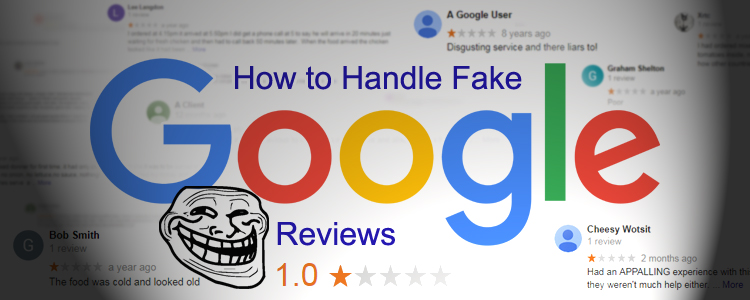
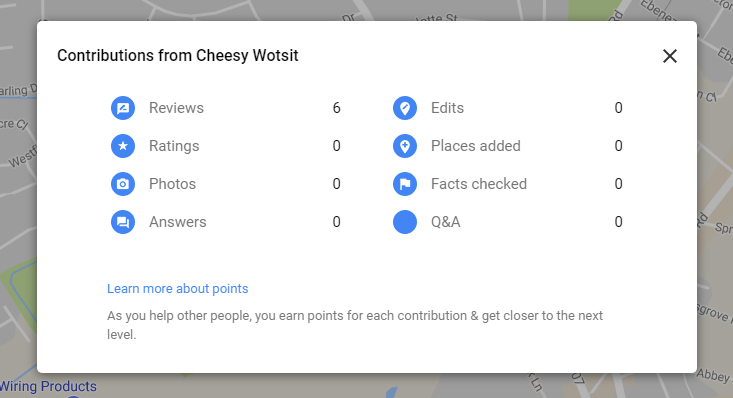
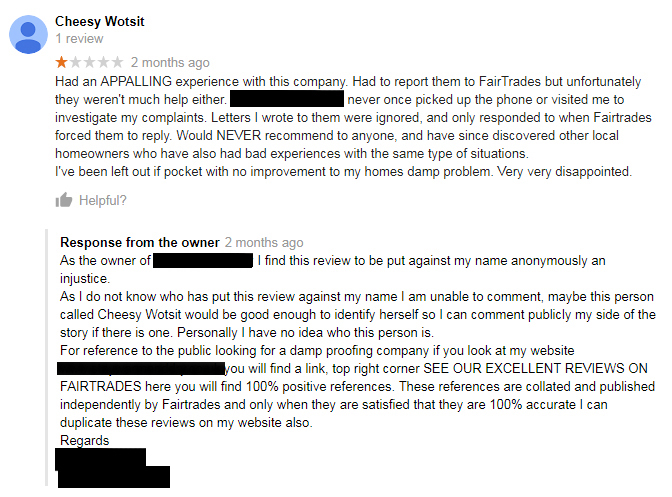
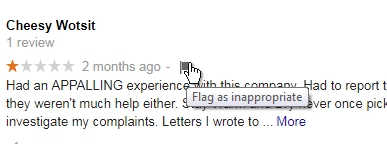
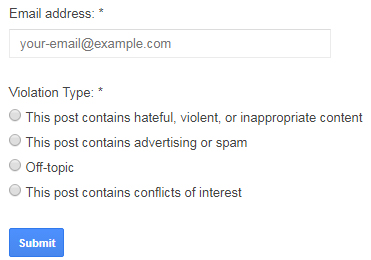
To be honest I do not know what is the solution for this as we are unable to remove the fake reviews. It’s so easy for the competitors to leave the fake reviews at your google business. Is there any way we can check/verify the user’s profile whether it is real or not?
I’ve received two fake reviews. The person who left the review on my local design business via Google is from the USA. They commented using an alias with an avatar pic.
I looked up the alias online and found it was the same name as a YouTube channel, which used the same avatar pic. Bingo.
Turns out it’s a kid from the USA. I found his email address on the YouTube channel.
Looked that up and discovered forum posts containing the same email address on MineCraft and hacking forums.
I went back to the YouTube channel and looked at the videos. Minecraft and other immature stuff.
Told Google all of this, but they were not interested. I actually talked to Google My Business via their Twitter in Direct Messages.
I laid everything out for them and they said the TOS have not been violated.
Google says these two reviews are legit. Bullshit!